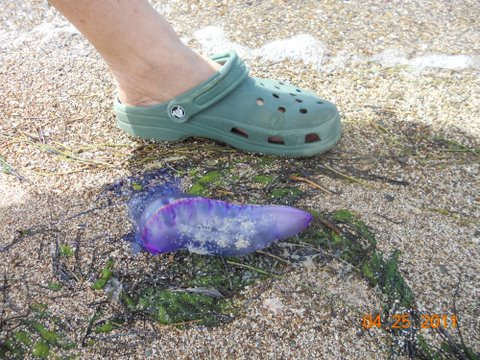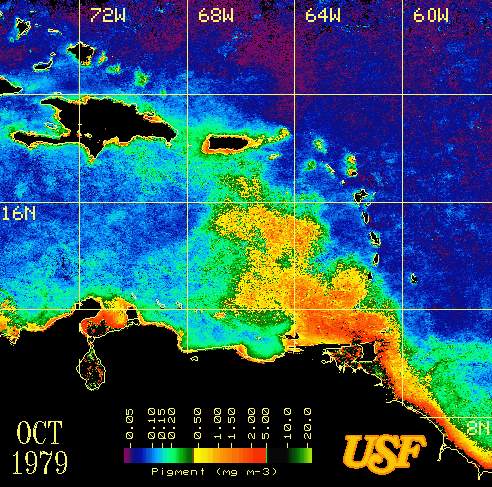
Source reader Lisa Dorsey and several friends spied four of the distinctive jellyfish with blue air sacks and long bluish tentacles while walking Easter Monday on the south shore west of Spring Bay, east of Longford and Ha’Penny Beach. The largest was about the size of a man’s hand.
While rarely fatal, the stingers can leave nasty, painful welts that last for days, and severe stings can poison the system, causing fevers and heart and breathing problems. And the tentacles can be many yards long.
Kids should not play with the purple sail balloon when they find it on the beach, said Zandy Hillis-Starr, National Park Service chief of resource management at Buck Island Reef National Monument.
"The stinging cells do not die, even on the beach," said Hillis-Starr on Wednesday afternoon.
"Swimmers should also be conscious that Man o’ War tentacles catch on the reef and fracture, so you can get stung even if no balloons are floating on top of the water," she said.
They often appear in the summer months when the wind comes in from the south.

According to William Coles, a marine biologist with Planning and Natural Resource’s Division of Fish and Wildlife, the creatures tend to appear from early summer until fall.
Heavy seasonal rains filling Venezuela’s Orinoco River cause a more or less annual plume of sediment and nutrients to flow far into the Caribbean, Coles said. "You can see the effect here when the water turns green in the summer," Coles said.
The nutrient plume spawns algae and krill and food for the Man o’ Wars. Prevailing currents tend to bring them toward St. Croix’s south shore, then around the island. But if there is a wind coming in from the south, it catches the creature’s sails and drives them onto the south shore, he said.
Few get stuck on shore, so when you see some on shore, there may be many in the water, he said.
"One of the things they do, you may see them washed up on shore and it will seem like there are a lot of them, but 10 minutes later they are gone," he said. "They deflate their air sacs and ride the undertow back out."
If you do get stung, do not rub the sting or plaster sand on it, as they can push the stinging nematocytes in and inject more venom. Also do not rinse with fresh water.
"If you pour fresh water on the sting, the cells contract and tend to put more venom in you," he said. Try brushing – not pressing – dry sand over the site to rub the stingers off without pushing them in, he suggested. "But you should seek medical attention," he said.
In Australia, where they have some much more dangerous species of jellyfish than the colorful Man o’ Wars, swimmers and surfers sometimes wear nylon pantyhose or lycra bodysuits as protection, Coles said. "The stingers are very small and cannot penetrate through even a thin layer of nylon hose," he said.
While they have a potential to be dangerous, and swimmers should leave the water if they see one, the creatures have been washing up on St. Croix shores for a very long time, injuries are very rare and there is no cause for any alarm, according to Coles.





